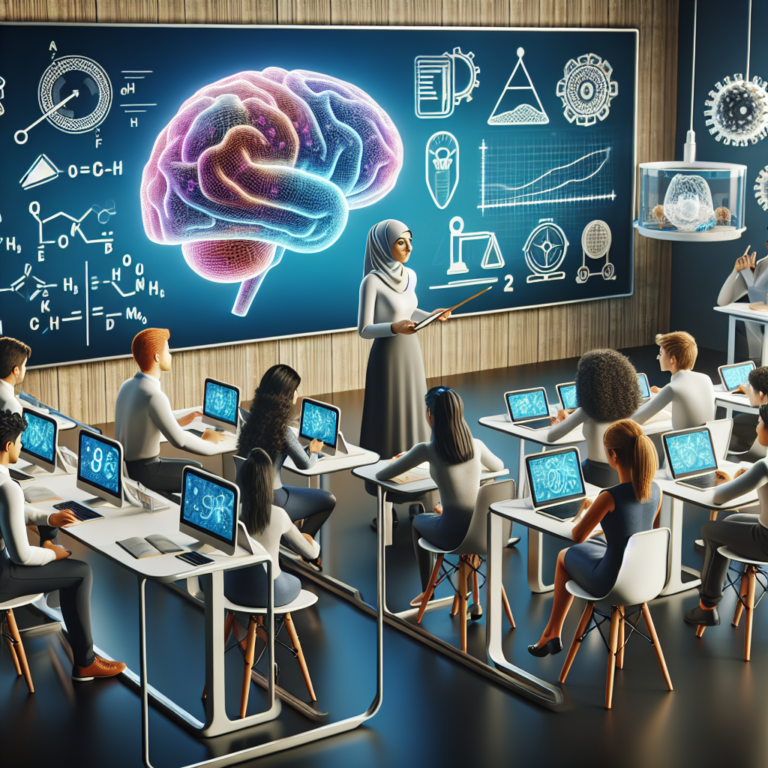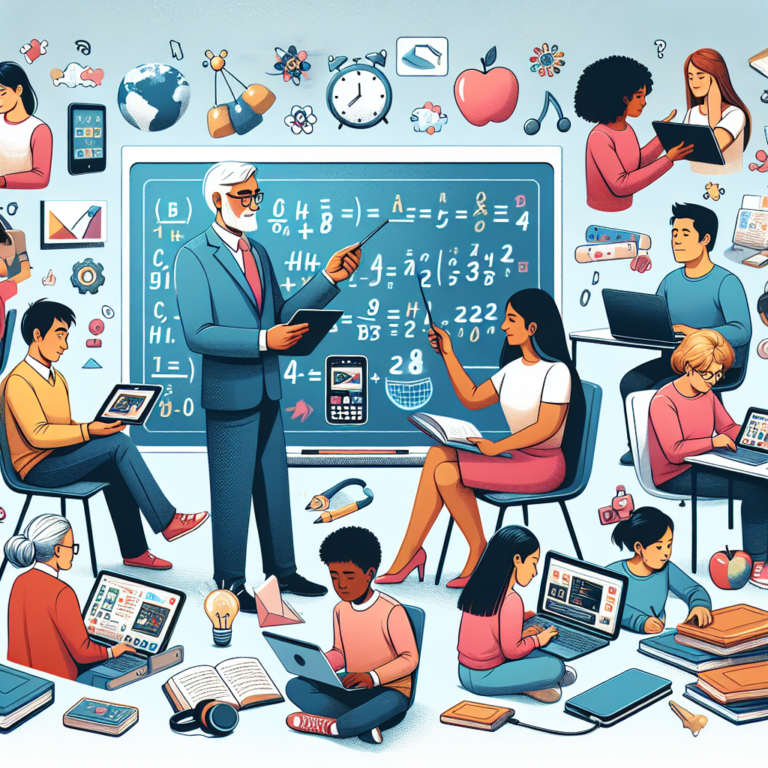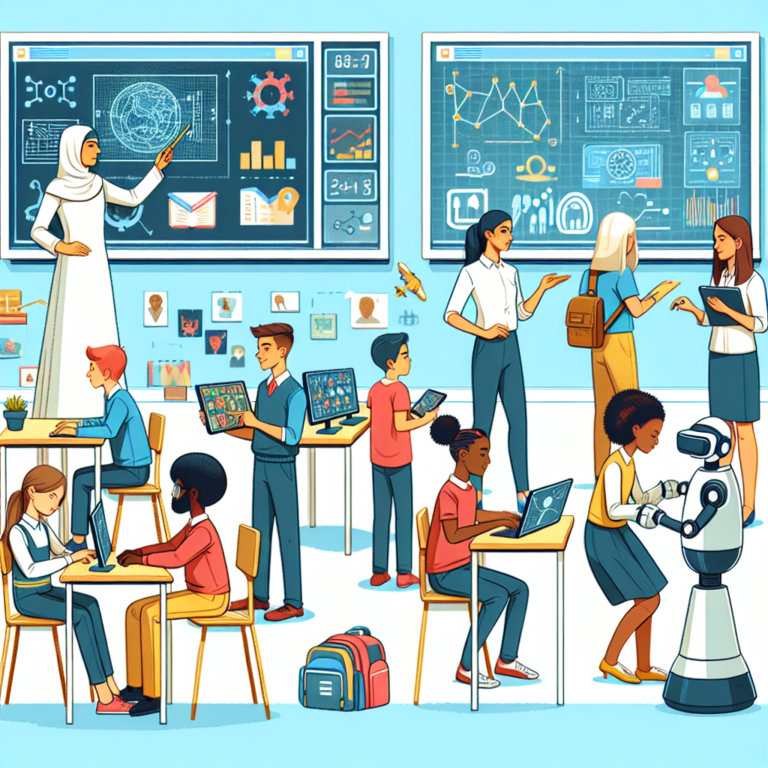Revolutionizing Education: The Power of Technology
The world of education is undergoing a seismic shift. Technology is at the heart of this transformation.
Education technology, or EdTech, is revolutionizing how we learn. It’s reshaping the traditional classroom, making education more accessible, engaging, and personalized.
From digital learning platforms to educational technology tools, the landscape is vast and varied. It’s a dynamic field, constantly evolving with the advent of new technologies.
This article delves into the power of technology in education. We’ll explore the role of educational technology consultants, insights from educational technology blogs, and the importance of digital resources.
Join us as we navigate the exciting world of EdTech. Discover how technology is not just changing education, but revolutionizing it.
Understanding Education Technology
Education technology, often referred to as EdTech, is a broad term. It encompasses all technological tools and resources used to enhance learning.
- It includes software, hardware, as well as processes and systems designed to promote and support education.
The scope of EdTech is vast. It spans from simple tools like calculators and projectors to complex learning management systems and AI-powered educational apps.
EdTech is not just about the tools. It’s also about how these tools are integrated into the learning process. It’s about transforming the way we teach and learn.
The Evolution of Educational Tools
The history of educational tools is as old as education itself. From the abacus to the modern computer, tools have always played a crucial role in learning.
In the 20th century, we saw the advent of radio and television in education. These technologies brought a new dimension to learning, making it more engaging and interactive.
The rise of the internet and digital technologies in the late 20th and early 21st century marked a turning point. It paved the way for the current era of digital learning and education technology.
Defining the Modern EdTech Landscape
Today’s EdTech landscape is diverse and dynamic. It includes a wide range of tools and technologies designed to enhance learning.
Online learning platforms, digital resources, and educational technology tools are now commonplace. They are transforming classrooms into digital learning environments.
The role of educational technology consultants is also gaining prominence. They guide schools and institutions in integrating technology into their curriculum effectively.
The modern EdTech landscape is not without challenges. Issues like the digital divide, privacy concerns, and the need for teacher training are key considerations. Despite these challenges, the potential of EdTech to revolutionize education is undeniable.
The Growth of Digital Learning
Digital learning is a key aspect of modern education. It refers to any type of learning that is facilitated by technology or by instructional practice that makes effective use of technology.
It involves the use of digital tools and resources to create, manage, and deliver learning content. It also includes the use of data and analytics to monitor student progress and personalize learning.
The growth of digital learning has been fueled by the rise of the internet and mobile technologies. These technologies have made learning more accessible, flexible, and personalized.
The COVID-19 pandemic has further accelerated the shift towards digital learning. With schools and universities forced to close, online education has become the new norm.
Online Education: A New Era of Learning
Online education is a key component of digital learning. It involves delivering educational content over the internet, allowing learners to study anytime, anywhere.
Online education offers several benefits. It provides flexibility, allows for self-paced learning, and can be more cost-effective than traditional education.
However, online education also poses challenges. These include issues related to internet access, student engagement, and the quality of online courses.
Learning Platforms: Connecting Knowledge and Technology
Learning platforms, also known as Learning Management Systems (LMS), are a key tool in digital learning. They provide a virtual environment for the delivery and management of educational content.
Learning platforms offer various features. These include course management, student tracking, assessment tools, and collaboration features.
The use of learning platforms has grown significantly in recent years. They are now used in schools, universities, and businesses around the world. They are transforming the way we teach and learn, connecting knowledge and technology in a powerful way.
The Role of Educational Technology Consultants
Educational technology consultants play a crucial role in the integration of technology in education. They provide expert advice and guidance to schools and educational institutions on how to effectively use technology to enhance learning.
These consultants assess the needs of an institution and recommend suitable technology solutions. They also provide training to educators on how to use these technologies effectively in their teaching.
Moreover, educational technology consultants help in the implementation of technology in the curriculum. They ensure that the technology is used in a way that aligns with the educational goals of the institution.
Bridging the Gap: Consultants and Educational Success
Educational technology consultants bridge the gap between technology and education. They understand both the educational needs of the students and the capabilities of the technology.
These consultants play a key role in ensuring the success of technology integration in education. They help schools and institutions overcome the challenges associated with technology adoption.
In essence, educational technology consultants are catalysts for change. They drive the digital transformation in education, helping to create a learning environment that is engaging, interactive, and effective.
Insights from Educational Technology Blogs
Educational technology blogs are a rich source of insights and ideas. They provide a platform for educators, technologists, and thought leaders to share their experiences and perspectives on the use of technology in education.
These blogs cover a wide range of topics. They discuss the latest trends in education technology, share best practices, and provide tips on how to effectively integrate technology into the curriculum.
Moreover, educational technology blogs often feature reviews of new tools and resources. They help educators stay updated on the latest developments in the field and make informed decisions about the use of technology in their classrooms.
Best Practices and Innovative Ideas
Educational technology blogs are a treasure trove of best practices and innovative ideas. They provide practical advice on how to overcome the challenges of technology integration and enhance the learning experience.
These blogs often feature case studies of successful technology implementations. They showcase how schools and institutions around the world are using technology to transform education.
In essence, educational technology blogs are a valuable resource for anyone interested in the intersection of technology and education. They inspire, inform, and empower educators to leverage the power of technology to revolutionize learning.
Educational Technology Tools and Resources
Educational technology tools and resources are transforming the way we teach and learn. They offer innovative ways to deliver content, engage students, and assess learning outcomes.
These tools range from learning management systems and digital textbooks to interactive whiteboards and mobile apps. They cater to different learning styles and needs, making education more personalized and accessible.
Moreover, educational technology resources such as online libraries, educational games, and virtual labs provide a wealth of information at our fingertips. They enrich the learning experience and foster a culture of self-directed learning.
Digital Resources: Enhancing the Learning Experience
Digital resources play a crucial role in enhancing the learning experience. They provide a diverse range of content in various formats, catering to different learning preferences.
These resources include e-books, online articles, videos, podcasts, and interactive simulations. They allow students to explore topics in depth and at their own pace, promoting active learning.
Furthermore, digital resources make learning more engaging and interactive. They incorporate multimedia elements, real-world scenarios, and gamification techniques to make learning fun and meaningful. In essence, digital resources are a powerful tool in the arsenal of education technology, revolutionizing the way we learn.
The Future of Education Technology
The future of education technology is promising and exciting. With rapid advancements in technology, we can expect to see more innovative tools and strategies that will further revolutionize education.
Artificial Intelligence (AI) and Machine Learning (ML) are expected to play a significant role in the future of education technology. They can provide personalized learning experiences, automate administrative tasks, and provide insights into student performance and learning patterns.
Moreover, the integration of Virtual Reality (VR) and Augmented Reality (AR) in education is on the rise. These technologies can provide immersive learning experiences, making education more engaging and effective.
Emerging Trends and Potential Innovations
Among the emerging trends in education technology, the rise of mobile learning stands out. With the ubiquity of smartphones and tablets, learning can happen anytime, anywhere, breaking the boundaries of traditional classrooms.
Another potential innovation is the use of blockchain technology in education. Blockchain can provide a secure and transparent way to store and verify educational credentials, reducing fraud and enhancing trust.
Lastly, the use of data analytics in education is expected to grow. Data analytics can provide valuable insights into student performance and learning outcomes, helping educators to tailor their teaching strategies and improve student success. The future of education technology is indeed bright, with endless possibilities and potential innovations.
Conclusion: Embracing the Digital Transformation in Education
The digital transformation in education is not just a trend, but a necessity. It is reshaping the way we teach, learn, and interact with knowledge. The integration of technology in education is no longer an option, but a requirement for a future-ready education system.
The power of education technology lies in its ability to make learning more accessible, engaging, and personalized. It opens up new avenues for learning, breaking down geographical, economic, and social barriers. It empowers learners to take control of their learning journey, fostering a culture of lifelong learning.
As we move forward, it is crucial for educators, policymakers, and stakeholders to embrace this digital transformation. It is not without challenges, but the potential benefits for students, educators, and society as a whole are immense. The future of education is digital, and it is here to stay.










